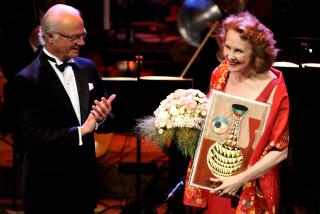PASSINGS: David Fanshawe, Hwang Yau-tai
- Share via
David Fanshawe
Collector of endangered music
David Fanshawe, 68, a widely traveled musical explorer best known as the composer of “African Sanctus,” died July 5, according to a statement on his website. Carolyn Date, chorus manager of the Bournemouth Symphony Chorus, who had worked with Fanshawe, said he had a stroke.
“African Sanctus,” which premiered in 1972, was based on music collected during four years of wanderings in Egypt, Sudan, Kenya and Uganda.
“He definitely thought of himself as a musical explorer, someone who would record music that he thought was in danger of extinction,” Richard Blackford, a composer and friend of Fanshawe, told BBC radio.
“His idea was to collate it into the format, the structure of the Catholic Mass, but to have a universal expression of those experiences that the Mass covers: life, death, celebrations and in particular the Lord’s Prayer.”
Fanshawe, who was born April 19, 1942, in England, estimated that he had been present for nearly 600 performances of “African Sanctus.” The Los Angeles Master Chorale performed the work in 1979.
His early musical education was as a chorister at St. George’s Chapel at Windsor Castle, and later at the Royal College of Music, where his studies alternated with travel.
Hwang Yau-tai
Popular Chinese composer
Hwang Yau-tai, 97, a Chinese composer whose works are well-known in the ChineseAmerican community as well as in Hong Kong and Taiwan, died July 4 at a hospital in Kaohsiung, Taiwan, his family said. He had been hospitalized for the last year after breaking both hips in a fall and died of multiple organ failure.
Hwang wrote more than 2,000 songs, including “Azaleas in Bloom,” a classic melody about a young woman who waits for her beloved to return from the Sino-Japanese war. Taiwan Panorama magazine described “Azaleas” as a “beautiful, stirring song that may be heard wherever Chinese people are to be found.” Taiwan President Ma Ying-jeou reportedly hummed the melody for Hwang during a recent visit to the composer’s sickbed.
Born Nov. 26, 1912, in China’s Guangdong Province, Hwang was the sixth of seven children in a well-educated family. His family’s fortunes changed drastically when his father died, leaving Hwang to grow up in extreme poverty. Hwang, however, excelled academically and demonstrated his musical gifts while in primary school, where a music teacher allowed him to play the school’s organ. He went on to study musical composition at Sun Yat-sen University in Guangdong and later became a music instructor for the Guangdong government.
In 1949, after the Communist victory in China, Hwang moved to Hong Kong, where he began a successful partnership with Taiwan author Chung Mei-yin. Their collaboration produced the enduring hits “Forgetting” and “When Evening Clouds Fill the Sky.”
Hwang taught at Hong Kong’s Chu Hai College of Higher Education for 30 years before moving to Taiwan in 1978.
-- Times staff and wire reports






